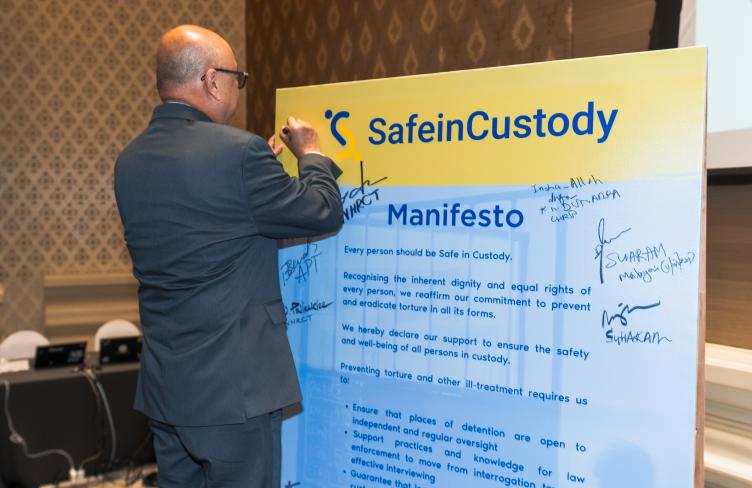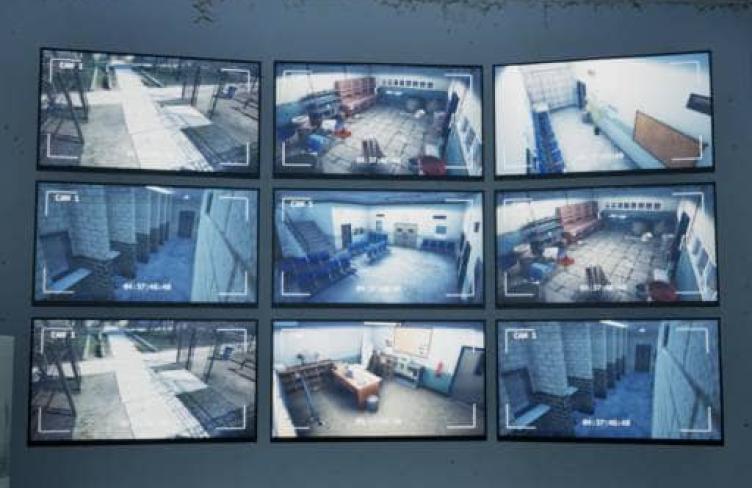
Experts Convene in Rio de Janeiro to Commence Development of a Set of Guidelines on Non-Coercive Interviewing and Procedural Safeguards Rio de Janeiro, Brazil – It is well-recognized that the risks of torture and ill-treatment are highest during the first hours of custody by law enforcement officers. In this context, the Anti-Torture Initiative (ATI), Association for the Prevention of Torture (APT) and Norwegian Centre for Human Rights (NCHR) announce the launch of a process to develop a set of guidelines for non-coercive interviewing by law-enforcement officers, and attendant legal and procedural safeguards. The aim is to ensure that persons detained and questioned for investigative purposes are not subjected to torture or other forms of ill-treatment.
The process is led by a Steering Committee composed of 15 experts and practitioners in the fields of criminal justice, law enforcement, psychology, human rights and torture prevention. In its first meeting on May 18 to 19 in Rio de Janeiro, the members adopted its plan of work, advanced towards the constitution of drafting groups and an advisory council, and outlined the envisioned framework of the standards.
As the Steering Committee’s work kicks-off, Juan E. Méndez, the former UN Special Rapporteur on Torture and member of the Committee, explained that: “the universal and absolute prohibition of torture and ill-treatment requires an equally universal set of affirmative standards on how best to conduct non-coercive interviews. The future standards will provide much-needed and essential guidelines to law enforcement, by conveying the reality that torture does not ‘work’.”
Mark Thomson, General Secretary of the APT and Steering Committee member, added: “This is a crucial step in reducing torture and other forms of ill-treatment around the world. Evidence shows that coercion and torture produce unreliable information which, in the long term undermines public safety and leads to mistrust in public institutions. Putting in place a set of guidelines on investigative interviewing and related procedural safeguards – such as granting the detainee effective access to a lawyer and informing the family –have a proven deterrent effect on torture in custody.”
Based on the NCHR’s experience of training law enforcement officers in investigative interviewing in Norway and around the world, Ragnhild Hennum, Director of the NCHR, stressed that: “the standards will be an extremely valuable tool in the practical work of law enforcement officers around the world.”
The process is expected to be complete by the year 2020.
For more information, please watch this two-minute animation video: “Changing Police Mindsets: From Coercion to Justice.”
About the call for the development of a Universal Protocol for Non-Coercive Interviewing and Procedural Safeguards
The call for the development of a universal protocol that would identify a set of standards for non-coercive interviewing methods and procedural safeguards was initially made by former UN Special Rapporteur on Torture and Faculty Director of the ATI, Juan E. Méndez in his October 2016 report to the General Assembly (A/71/298). Invigorated by the robust enthusiasm the appeal received, the ATI and its partners organized a number of meetings and events to further advance the development of the protocol, including a strategy meeting in January 2017 in Geneva co-hosted with the APT; a technical roundtable in June 2017 in New York co-hosted with the OHCHR; and a high-level discussion during the first week of the UN General Assembly meetings in September that included the participation of the High Commissioner for Human Rights.
About the Institutional Partners:
- The Anti-Torture Initiative (ATI) was founded in 2011 as a core project of the Center for Human Rights & Humanitarian Law at American University Washington College of Law to expand the reach and practical implementation of the work of the former UN Special Rapporteur on Torture and Other Cruel, Inhuman and Degrading Treatment or Punishment, Professor Juan E. Méndez in the fight to prevent torture worldwide. Since it was established, the ATI has created a variety of mechanisms and strategies, which have enabled the former SRT’s work to have an unprecedented impact.
- The Association for the Prevention of Torture (APT) was founded in 1977 by Swiss banker and lawyer, Jean-Jacques Gautier. Founded on the insight that torture and forms of ill-treatment happen behind closed doors, and that it would be possible to prevent torture through a worldwide system of unannounced visits by external actors to places of detention, the APT has been at the origin of the main regional and international treaties on the prevention of torture, notably the Optional Protocol to the UN Convention against Torture (OPCAT), the European Convention for the Prevention of Torture and the Robben Island Guidelines for the Prevention and Prohibition of Torture in Africa.
- The Norwegian Centre for Human Rights (NCHR) is a multidisciplinary centre at the University of Oslo whose activities are based upon research and teaching, in addition to the activities as a host for several international programs. The NCHR is internationally recognized as a leading research institution in the field of human rights, with research staff that includes lawyers, political scientists, social anthropologists, social geography and philosophy.
For additional information, please contact:
- Vanessa Drummond - Assistant Project Director, ATI (vdrummon@wcl.american.edu)
- Gisle Kvanvig – Director ASEAN/Vietnam, NCHR (gisle.kvanvig@nchr.uio.no)
- Anne Lardy – Advocacy and Legal Advisor, APT (alardy@apt.ch)
- Andra Nicolescu – Advocacy and Legal Advisor, APT (anicolescu@apt.ch)


